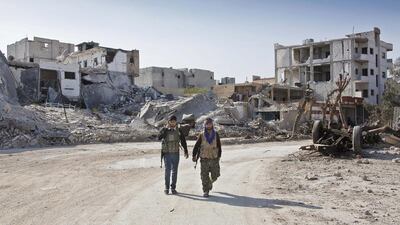BEIRUT // Kurdish forces in control of much of northern Syria have committed war crimes, razing villages and displacing at least thousands of civilians, Amnesty International said on Tuesday.
In its latest report, the right group claimed that the US-backed People’s Protection Units (YPG) and a police force known as the Asayish committed violations of international humanitarian law in the towns and villages they captured from ISIL in the past year.
Based on visits to 14 villages and towns and interviews with local residents, Amnesty said Syrian Kurdish forces have destroyed villages and forcibly displaced entire populations.
In some instances, residents said the violations were motivated by animosity or revenge after Kurdish security forces suffered losses in attacks. The attacks sometimes targeted local residents for their ethnicity, the report said.
“By deliberately demolishing civilian homes, in some cases razing and burning entire villages, displacing their inhabitants with no justifiable military grounds, the Autonomous Administration is abusing its authority and brazenly flouting international humanitarian law, in attacks that amount to war crimes,” said Lama Fakih, senior crisis adviser at Amnesty International.
The Autonomous Administration – the organisation overseeing Kurdish-controlled areas of Syria – is led by the PYD, the political wing of the YPG.
Spokesmen for the YPG did not immediately respond to requests for comment from The National.
In the village of Husseiniya in Hassakeh province, satellite images analysed by Amnesty showed that out of 225 buildings standing in June 2014, just 14 remained a year later.
The group said that destruction was not consistent with shelling, but rather demolition.
Local residents told Amnesty that YPG forces destroyed the Arab village soon after they captured it from ISIL in February.
Another resident from the village of Asaylem in Raqqa province said the YPG demolished 100 of the 103 homes in his village when they entered it in June.
However, according to the report, forced displacement is a far more common violation in areas controlled by the YPG than the destruction of homes.
In the town of Hammam Al Turkman, a local resident told the human rights group that 1,400 Turkmen families were ordered to leave in June. Residents said half of the population was allowed to return in August after “extensive negotiations”.
The forced evictions in the town reportedly came after YPG fighters died in car bombs and residual clashes with ISIL in and around the town.
The director of the Asayish police forces, Ciwan Ibrahim, told Amnesty that only 25 families had been forced to leave their homes across all of the territory in Syria administered by the Kurds. He said they were told to leave for their own safety due to the threat from relatives of ISIL militants who lived in the Kurdish-run territory and were passing information to the “terrorists”.
There were also indications that some YPG officers have used their group’s close ties with US forces to intimidate civilians by threatening them with air strikes.
“They told us we had to leave or they would tell the US coalition that we are terrorists and their planes would hit us and our families,” one resident of the village of Raneen in Raqqa province told researchers.
Residents of the nearby villages of Al Ghbein and Hammam Al Turkman also reported that the YPG made similar threats to them.
The YPG has been seen as the only reliable and effective US ally on the ground in Syria. The group has spearheaded major assaults into ISIL territory in Syria’s north-east and directly co-ordinates air strikes with coalition forces.
The report comes at a time when the YPG is gaining strength and is reportedly planning an assault on Raqqa – ISIL’s most important city in Syria – “within weeks”.
On Monday, the YPG announced that it had joined Syrian Arab fighting groups to form a new alliance called the Democratic Forces of Syria.
US officials said on the same day that Washington had delivered 50 tons of ammunition to Syrian Arab rebels in northern Syria to be used in the fight against ISIL. Washington denied claims that it had delivered the weapons to the YPG, but YPG sources told several news agencies separately that they also received ammunition delivered by US airdrops late on Sunday.
The US airdropped weapons and ammunition to the YPG one year ago when its forces were besieged by ISIL in the border town of Kobani. But since then, while still coordinating attacks with the group, Washington has been wary of providing more substantial support amid objections from Turkey, which is concerned about the separatist ambitions of the YPG and its close ties to the PKK.
“It is critical that the US-led coalition fighting [ISIL] in Syria and all other states supporting the Autonomous Administration, or coordinating with it militarily, do not turn a blind eye to such abuses,” said Amnesty’s Ms Fakih.
“They must take a public stand condemning forced displacement and unlawful demolitions and ensure their military assistance is not contributing to violations of international humanitarian law.”
foreign.desk@thenational.ae

